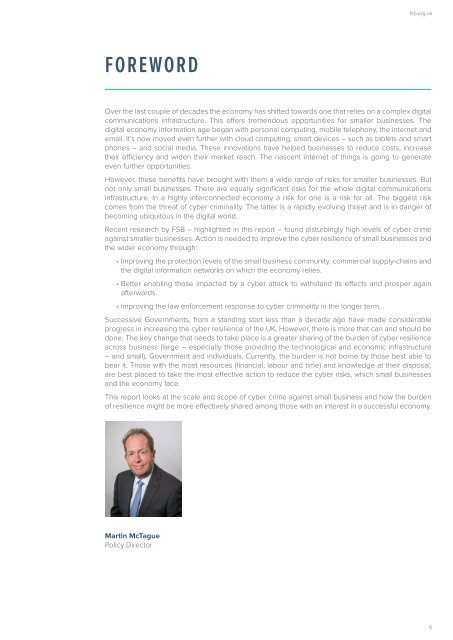CYBER RESILIENCE HOW TO PROTECT SMALL FIRMS IN THE DIGITAL ECONOMY
FSB-Cyber-Resilience-report-2016
FSB-Cyber-Resilience-report-2016
You also want an ePaper? Increase the reach of your titles
YUMPU automatically turns print PDFs into web optimized ePapers that Google loves.
fsb.org.uk<br />
FOREWORD<br />
Over the last couple of decades the economy has shifted towards one that relies on a complex digital<br />
communications infrastructure. This offers tremendous opportunities for smaller businesses. The<br />
digital economy information age began with personal computing, mobile telephony, the internet and<br />
email. It’s now moved even further with cloud computing, smart devices – such as tablets and smart<br />
phones – and social media. These innovations have helped businesses to reduce costs, increase<br />
their efficiency and widen their market reach. The nascent internet of things is going to generate<br />
even further opportunities.<br />
However, these benefits have brought with them a wide range of risks for smaller businesses. But<br />
not only small businesses. There are equally significant risks for the whole digital communications<br />
infrastructure. In a highly interconnected economy a risk for one is a risk for all. The biggest risk<br />
comes from the threat of cyber criminality. The latter is a rapidly evolving threat and is in danger of<br />
becoming ubiquitous in the digital world.<br />
Recent research by FSB – highlighted in this report – found disturbingly high levels of cyber crime<br />
against smaller businesses. Action is needed to improve the cyber resilience of small businesses and<br />
the wider economy through:<br />
• Improving the protection levels of the small business community, commercial supply-chains and<br />
the digital information networks on which the economy relies.<br />
• Better enabling those impacted by a cyber attack to withstand its effects and prosper again<br />
afterwards.<br />
• Improving the law enforcement response to cyber criminality in the longer term.<br />
Successive Governments, from a standing start less than a decade ago have made considerable<br />
progress in increasing the cyber resilience of the UK. However, there is more that can and should be<br />
done. The key change that needs to take place is a greater sharing of the burden of cyber resilience<br />
across business (large – especially those providing the technological and economic infrastructure<br />
– and small), Government and individuals. Currently, the burden is not borne by those best able to<br />
bear it. Those with the most resources (financial, labour and time) and knowledge at their disposal,<br />
are best placed to take the most effective action to reduce the cyber risks, which small businesses<br />
and the economy face.<br />
This report looks at the scale and scope of cyber crime against small business and how the burden<br />
of resilience might be more effectively shared among those with an interest in a successful economy.<br />
Martin McTague<br />
Policy Director<br />
5


